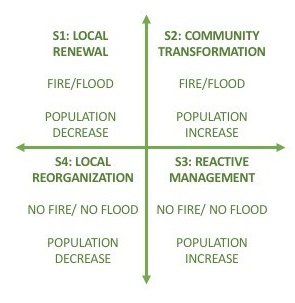- About Us
- Events & Training
- Professional Development
- Sponsorship
- Get Involved
- Resources
Stepping up to Climate Change and Risk Reduction – Chelan CountyThe small community of Plain will be studied to analyze strategies to mitigate for post-wildfire flooding. This article is a result of the Washington APA Ten Big Ideas Initiative, an outgrowth of the Game Changing Initiative designed to bring about far reaching and fundamental change on a variety of issues. Topics include addressing climate change, rebuilding our infrastructure, restoring and protecting our ecosystems, supporting economic development and supporting sustainable agriculture. A combination of climate change coupled with fire exclusion and lack of active resource management has led to larger and more severe forest fires in the Western United States (Littell et al. 2009, Abatzoglou et al. 2016). For instance, in 2014 and 2015 over 1.25 million acres burned in Washington State. Those fires were triggered by unusually hot temperatures 4 to 9 degrees above average in June . Landslides and flooding soon followed suit due to the lack of vegetation and hydrophobic soils that could not absorb the rainfall. Communities struggled to recover from the fire and subsequent flooding events. Fire and flooding threats are high and real around communities in Eastern Washington. This is why FEMA funded a project in Central Washington to explore adaptive strategies in the wildland urban interface to mitigate against flooding after severe large wildfires. The project area is the community of Plain located north of the City of Leavenworth in Chelan County. Plain is a rapidly changing rural community with development primarily along the waterways and transportation routes. It is surrounded by federal and state forests which provide an attractive ecosystem for people to live, play, and work in. The interaction between human and natural ecosystems in the area is evolving. Planners need to examine how to manage both systems and be resilient to events. To examine the complex system, researchers at the University of Washington’s Institute of Hazards Mitigation Planning and Research and the School of Environmental and Forest
Sciences used scenario planning coupled with appreciative inquiry story telling methods. First the project team identified fire, flooding, and population as the most important and uncertain drivers of change in the forest ecosystem and collected data for these drivers. Historical fires in the region, temperature, rainfall are some data elements that were used to predict area burned and severity of fire events in the study area. Flooding risk was based on the fire ignition at the most probabilistic areas, sediment blocking streams, and HAZUS mapping. Projected population was based on percentage of change from 2000 – 2010 and applied to subsequent decades. Based on this information four alternative future scenarios were created and presented in a workshop with community members (Figure 1). Participants discussed community values and objectives then applied them to each scenario to develop adaptive strategies to mitigate against fire and flooding for the next 60 years. Researchers will also examine issues following fires such as forest restoration, log-term soil loss, and soil retention on slopes to reduce the risk of flooding events. Information gathered in this workshop and research will be analyzed and a set of recommendations will be provided to the community. Implementing strategies that do not limit future actions is the primary focus. This method of planning accounts for uncertainty and allows planners flexibility when planning for the community. The approach brings together different stakeholders to find their own alternatives as a fire resilient community with a high fire risk. Author Lan Nguyen is a PhD student at the University of Washington, Department of Urban Design and Planning, working at the Institute of Hazards Mitigation Research and Planning on this project. She can be contacted at [email protected]. Project team members include: Bob Freitag (PI), Research Associate Professor Ernesto Alvarado (Co-PI), Assistant Professor Himanshu Grover (Co-PI), Harry Podschwit (PhD student) Fabiola Pulido-Chavez (M.S. student), Michael Godfried (Planner) and Stephen Veith (GIS Analyst). References: Stepping up to address climate change at the state, regional, and local levels is one of the Ten Big Idea Initiatives. This work culminated in a short video focusing on the science of climate change, highlighting actions of three local communities, and a Resilient Washington document — 17 written discussion briefs addressing adaptation and mitigation strategies for local governments. The briefs are grouped in three sections — Planning Approaches for Resilience, Strategies for Planning Resilient Communities, and Preparing for Climate Related Events. The video and discussion briefs can be found at http://www.washingtonapa.org/addressclimatechange. |


